
Climate change is one of the most pressing challenges humanity faces today. Every year, the world experiences more severe wildfires, floods, and hurricanes, affecting millions of people and costing billions in damages. Addressing this crisis requires global collaboration because no single country can solve it alone. President Donald Trump declared Monday, his first day in office after being reelected, that he will withdraw once again from the 2015 Paris climate agreement. This decision raises significant concerns about the progress we can make in combating climate change without unified international cooperation.
Global climate agreements, like the Paris Agreement, are treaties where countries commit to working together to reduce greenhouse gas emissions. These agreements set targets for cutting emissions, provide funding for clean energy projects, and create a framework for sharing technology and knowledge across borders.
The goal of these agreements is simple: to keep global temperatures from rising more than 1.5 to 2 degrees Celsius above pre-industrial levels. Scientists agree that going beyond this threshold could lead to irreversible damage to our ecosystems, economies, and communities.
Climate change is a global problem caused by emissions from all countries. Even if one country takes aggressive action to reduce emissions, it won’t be enough unless others do the same.
Working together allows countries to invest in clean energy and create jobs in new industries like wind, solar, and electric vehicles. According to the International Renewable Energy Agency (IRENA), transitioning to renewables could create 42 million jobs globally by 2050.
Many small and developing countries face the worst impacts of climate change, like rising sea levels and extreme weather, despite contributing the least to the problem. Climate agreements ensure that wealthier nations help fund adaptation and mitigation efforts in these regions.
When a country leaves a climate agreement, it sends a message that international cooperation isn’t a priority. Here are some consequences:
Without commitments to global goals, countries may delay taking the necessary steps to reduce emissions. This could make it harder to prevent catastrophic climate impacts.
Clean energy is the fastest-growing sector globally. Countries that don’t participate in climate agreements may miss out on economic opportunities as the world shifts toward renewables.
Climate agreements rely on trust and accountability. When one nation withdraws, it can weaken the confidence of other nations and discourage them from meeting their own commitments.
Even if national policies falter, many cities and states are stepping up to meet climate goals. For example, California has its own ambitious emissions targets and invests heavily in renewable energy.
Use your voice to call for stronger environmental protections. Support leaders and policies that prioritize clean energy, conservation, and sustainability.
Knowledge is power. Follow reputable organizations like the United Nations Climate Change program to stay updated on global efforts.
Addressing climate change requires all of us to work together. While setbacks like leaving climate agreements are discouraging, they don’t have to stop progress. By pushing for stronger action at every level—from local to global—we can build a cleaner, safer future for everyone.
Let’s not lose sight of the bigger picture. The climate crisis affects us all, and solving it will take collective effort, innovation, and determination. Together, we can ensure that no community is left behind in the fight for a sustainable future.
01/20/2025 – This article has been written by the FalseSolutions.Org team